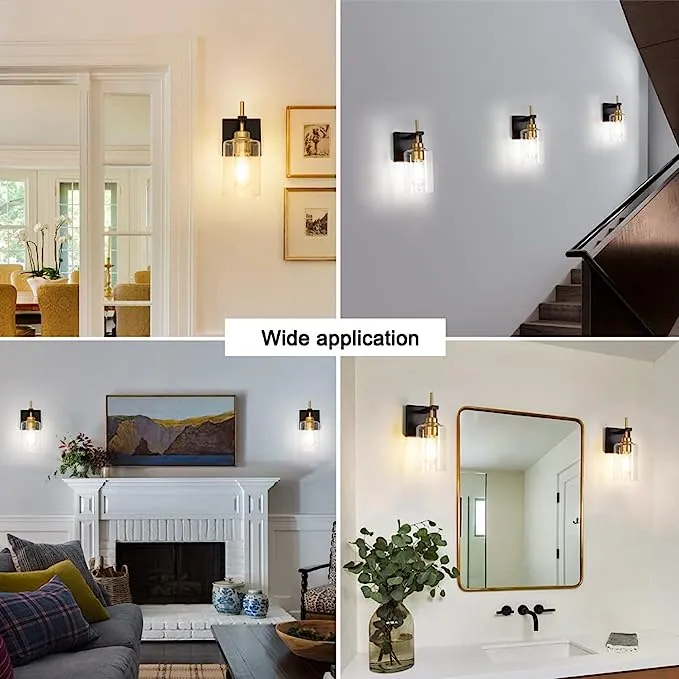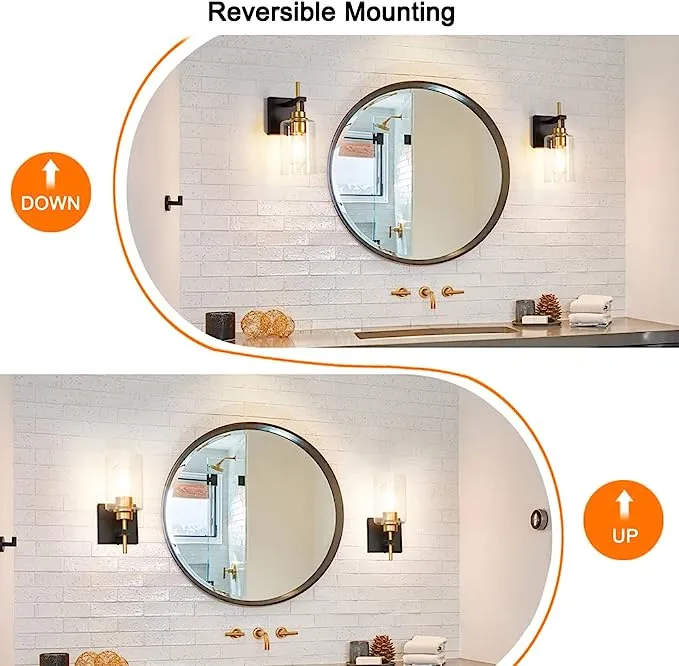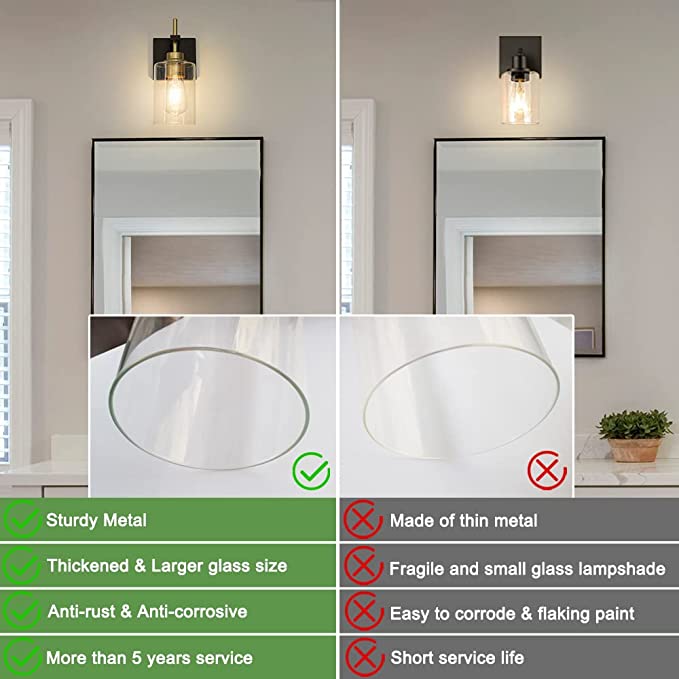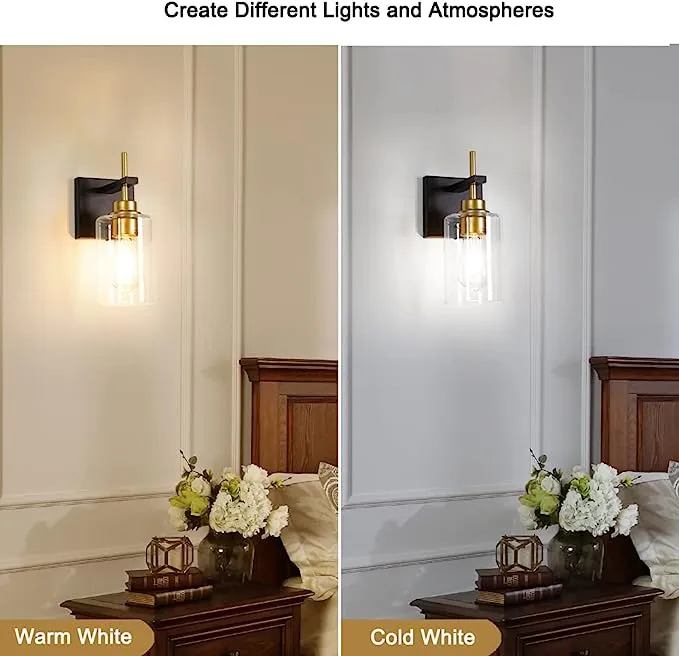How Many Lights Should Be Installed on a Bathroom Vanity?
In modern home design, the bathroom is no longer just a simple cleaning space, but a private sanctuary that combines functionality and aesthetics. Whether it's morning grooming or evening relaxation, good lighting is a key factor in creating a comfortable experience. Among all lighting fixtures, bathroom vanity light fixtures play a crucial role.
So, how many lights should be installed on a bathroom vanity? This is a question many people who are renovating or remodeling their bathrooms have.
This article will systematically analyze the principles for choosing the number of bathroom vanity light fixtures from multiple perspectives, including lighting needs, space size, lighting layout, light source color temperature, and installation location, helping you create a practical and aesthetically pleasing lighting environment.

Why is the Number of Bathroom Vanity Light Fixtures So Important?
Many people focus only on the brightness of the main light when renovating their bathrooms, neglecting the independent lighting design for the vanity area. In fact, as the main area for daily washing, skincare, makeup, and shaving, the vanity has extremely high requirements for lighting.
Dim lighting can lead to uneven makeup application and an incomplete shave; while overly bright or misaligned light sources can create glaring shadows, negatively impacting the user experience.
The number of bathroom vanity light fixtures directly determines whether the lighting is even, accurately reflects skin tone, and avoids creating shadows on the face. Therefore, it's not just an aesthetic issue, but a balance between practicality and comfort.
A suitable number of lights ensures more even light distribution, allowing you to see your most authentic and natural self in the mirror.

What are the key factors in determining the number of bathroom vanity light fixtures?
Different bathroom layouts, space sizes, and mirror widths all impose different requirements on the number of lights.
1. Space Size and Ceiling Height
The larger the bathroom, the higher the demand for overall lighting. If the vanity is in a large space, a single light may not be able to cover the entire facial area; in this case, consider a combination of lights, such as installing two bathroom vanity light fixtures symmetrically on the left and right sides.
Conversely, if the bathroom is small and the ceiling is low, a single light fixture with high color rendering and soft light may suffice.
2. Mirror Dimensions
The width and height of the mirror are another key parameter determining the number of lights required. Generally speaking:
• For mirrors less than 60cm wide, one symmetrical bathroom vanity light fixture can be installed.
• For mirrors between 60cm and 120cm wide, two symmetrically arranged vanity lamps are recommended.
• For mirrors exceeding 120cm or for vanities used by two people, consider three or more light fixtures or an integrated front light strip design.
The wider the mirror, the more difficult it is to maintain uniform lighting. Multiple lights can more effectively prevent uneven lighting on the face.
3. Usage Needs
Different usage scenarios have different lighting requirements.
• If primarily used for daily washing, one moderately bright bathroom vanity light fixture is sufficient.
• If frequent makeup and skincare are performed, it is recommended to install two or more light fixtures to reduce shadows and improve facial detail visibility.
• If multiple people share a bathroom, the light fixtures should be arranged according to each user's location and the width of the mirror.
4. Light Source Brightness and Color Temperature
The number of lights is not only related to the space but also to the brightness (lumen value) of the light source. If high-brightness LED light sources are used, a small number of fixtures may be sufficient to achieve ideal illumination.
At the same time, the color temperature of the bathroom vanity light fixtures also affects the overall lighting effect:
• 2700K~3000K: Warm light, suitable for creating a relaxing atmosphere;
• 4000K~4500K: Neutral light, close to natural sunlight, the most suitable color temperature for grooming lighting;
• Above 5000K: Cooler light, suitable for makeup or shaving scenarios requiring precise observation.
Therefore, even with the same number of lights, differences in color temperature and brightness will result in significantly different visual effects.

How many bathroom vanity light fixtures are generally suitable?
1. Single vanity: 1-2 lights are recommended
For a standard single vanity (approximately 60-90cm wide), it is generally recommended to install two symmetrical bathroom vanity light fixtures, one on each side of the mirror. The light illuminates the face from the side, minimizing shadows.
If bathroom space is limited, a high-brightness light fixture with a color rendering index (CRI) of 90 or higher can be installed directly above the mirror to create uniform lighting.
2. Double vanity: 3-4 lights are recommended
Double vanities are often wider (over 120cm). To ensure good lighting for both users, it is recommended to use two symmetrical light fixtures on each side, or to install a linear strip of bathroom vanity light fixtures above the mirror.
Multiple light fixtures provide more even light coverage and allow for individual control of brightness in different areas.
3. Integrated Mirror Cabinet or Vanity Light Solution
If you choose an integrated mirror cabinet or vanity light with built-in LED strips, the internal design is usually optimized for optical angles. Although there may only be one strip, the actual effect is equivalent to a combination of multiple light sources.
The key here is to choose the appropriate length and brightness to ensure sufficient illumination while maintaining soft, non-glaring light.
Where is the best place to install bathroom vanity light fixtures?
The direction and placement of light are equally important. Even with a sufficient number of bathroom vanity light fixtures, improper placement can lead to glare or shadows.
1. Symmetrical Layout on Both Sides
This is the most classic and optically sound layout. Installing two lights symmetrically on either side, at eye level or slightly higher (5-10cm), provides even illumination of the face and avoids shadows.
2. Above the Mirror Installation
If bathroom space is limited or the mirror is narrow, you can choose to install one or more bathroom vanity light fixtures above the mirror, ensuring the light is tilted downwards at approximately a 45° angle so that the light naturally covers the entire face area.
3. Backlighting Design Behind the Mirror
Some modern bathrooms use a backlighting design, where the light softly diffuses from behind the mirror. This method looks more sophisticated, with even, glare-free light, but the brightness is relatively low, so it is recommended to use it in conjunction with other light fixtures.
The Impact of Different Light Fixture Types on the Number of Fixtures
Bathroom vanity light fixtures come in a variety of types, and different designs will affect the actual number of fixtures needed. Some common types include:
1. Wall-Mounted Vanity Lamp
These fixtures are often installed on both sides of the mirror, come in various shapes, and are easy to adjust the angle. It is usually recommended to install two to effectively balance the light from both sides.
2. Mirror Light Strip
One light strip can replace two to three individual light fixtures, suitable for minimalist bathrooms. If you choose a light strip with high luminous efficacy and good color rendering, one strip is sufficient for your lighting needs. 3. Ceiling Light and Vanity Lamp Combination
If the bathroom already has a main light, the number of vanity lamps can be reduced. Usually, one main light and one vanity lamp are sufficient.
4. Recessed Lighting
Recessed lighting fixtures are installed in the ceiling. If the light angle is suitable, they can also be used as auxiliary light sources, reducing the number of vanity lamps. However, this method requires careful planning of the location and wiring during the initial renovation phase.
How to Determine if Bathroom Vanity Light Fixtures are Bright Enough?
Many people still feel the lighting is unsatisfactory after installing lights; the problem is often insufficient illumination.
To determine if bathroom vanity light fixtures are bright enough, consider the following:
• Illuminance Standard: The recommended illuminance for the vanity area is between 500 and 1000 lux.
• Color Rendering Index (CRI): It's recommended to choose fixtures with a CRI > 90 for accurate skin tone reproduction.
• Light Distribution: Ensure even lighting across the entire face, without noticeable shadows or dark corners.
• Color Coordination: Too high a color temperature will appear cold and harsh, while too low a temperature will appear yellowish. A neutral, natural light is ideal.
If a single light is insufficient, adding one or two auxiliary lights is the best solution.
Are more bathroom vanity light fixtures always better?
No. Too many fixtures can lead to light pollution and energy waste. The key is a reasonable layout and appropriate brightness. Generally, two lights are sufficient for a single vanity, while three to four are ideal for a double vanity.
Can I install only a main ceiling light and not a vanity light?
Not recommended. The main ceiling light shines downwards, easily creating shadows on the face, which is inconvenient for makeup application and shaving. The supplementary lighting provided by bathroom vanity light fixtures cannot be replaced by a main light.
Can ordinary household light bulbs be used for vanity lamps?
Theoretically, yes, but it's not recommended. Bathroom environments are humid, and ordinary light bulbs have poor waterproof performance. It's recommended to choose a bathroom-specific vanity lamp with anti-fog and moisture-proof design.
Which is more suitable for a vanity, LED or halogen lamps?
LED lamps are more energy-efficient, have a longer lifespan, and higher color rendering index (CRI), making them the most suitable light source for bathroom vanities. Modern high-CRI LED lamps can almost completely reproduce natural skin tones.

Professional advice for choosing bathroom vanity light fixtures
• CRI ≥ 90: Accurately reflects skin tone and makeup.
• Protection rating ≥ IP44: Ensures waterproof and moisture-proof properties.
• Color temperature around 4000K: Closest to the natural color of sunlight.
• Adjustable brightness: Flexible dimming for different scenarios.
• Anti-glare design: Protects eyesight and avoids prolonged glare.
When choosing the quantity and model, it is recommended to prioritize overall lighting harmony rather than simply pursuing brightness or quantity.
The Scientific Principles of Bathroom Vanity Light Fixture Quantity
Vanity Types | Recommended number of lights | Recommended layout | Notes |
| Single Dressing Table | 1-2 lights | Symmetrical left and right or centered above the mirror | Suitable for small spaces |
| Double Dressing Table | 3-4 lights | Double-person area on the left and right | Ensure even lighting |
| Integrated Mirror Cabinet | 1 light strip | Linear light source from the top | Pay attention to brightness and color temperature |
| Small Bathroom | 1 light | Center or side of the mirror | Can be used in conjunction with a main light |
| Large Bathroom | 2-4 lights | Symmetrical layout + auxiliary lighting | For more balanced light |
Therefore, the number of lights to install on a bathroom vanity depends on the size of the space, the width of the mirror, usage needs, and the brightness of the light source.
Generally speaking:
• Single use → 2 lights are optimal;
• Double use → 3-4 lights are ideal;
• If combined with a high-brightness main light or linear light strip, the number can be appropriately reduced.
By adhering to the principles of uniform lighting, natural color rendering, and waterproof safety, bathroom vanity light fixtures can not only be practical and aesthetically pleasing but also become a highlight of the entire space.
What packaging and branding services can buyers request?
We offer full packaging customization for OEM and private-label clients. Buyers can select color boxes, barcodes, instruction leaflets, and printed logos to align with their brand identity. Our designers assist in creating attractive packaging suitable for retail shelves or online marketplaces.
Small batch trial orders are available before mass production. As a direct manufacturer, Huari provides cost-effective printing and packaging solutions with consistent quality.
